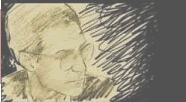

home | biografia | interviste | conferenze | le sue opere | cont@tti | credits | indice corso
"CYBERCULTURE AND EDUCATION"
Abstract della presentazione del proprio corso all’università di Parigi
![]()
Any
serious consideration given to the future of education and training
in the new cyberculture must be preceded by a careful analysis of the
profound changes occurring in the way we learn and acquire knowledge.
In this regard, we must first acknowledge the speed at which knowledge
and know-how appears and is being updated. For the first time in the
history of humanity most of the skills a person acquires at the beginning
of his career will be obsolete at the end of his professional life.
The second observation, which is related to the first, concerns the
change in the way we work, where the amount of time devoted to the transfer
of knowledge is constantly increasing. Work is more and more synonymous
with learning, transferring know-how and producing knowledge. Third
observation: cyberspace supports intellectual technologies which amplify,
materialize, and transform a number of human cognitive functions: memory
(data bases, hyperdocuments, digital files of all kinds), imagination
(simulations), perception (digital sensors, telepresence, virtual reality),
thinking (artificial intelligence, modeling of complex phenomena). Such
intellectual technologies promote:
• new ways of accessing information: hyperdocumentation, finding
information using "search engines", knowbots or software agents,
contextual explorations using dynamic data maps.
• new ways of thinking and reasoning: such as simulation - an
industrialized form of thought experiment that cannot be equated with
logical deduction or induction through experience.
Due to the fact that these intellectual technologies - particularly
dynamic memory - have been materialized in digital documents or softwares
that can be consulted by network (or easily reproduced and transferred),
they can be shared with a large number of people thus augmenting the
potential collective intelligence of human groups.
The knowledge-flow, the work-transaction of knowledge, the new technologies
of collective and individual intelligence are all dramatically altering
our approach to education and training. What must be learned can no
longer be planned and precisely defined in advance. Career paths and
profiles are all different and are more and more difficult to channel
into programmes or courses that are valid for everyone. We must build
new models that more accurately portray this new space of knowledge.
The traditional representation (linear, parallel step-ladders with pyramids
structured into levels) geared by the concept of prerequisite and converging
toward "higher" education, must be gradually replaced by a
representation of open, emerging spaces of knowledge that are continuous,
evolving, non-linear, and are reorganising according to specific objectives
or contexts and where each individual enjoys a distinct, evolving position.
Two major reforms of education and training systems are thus necessary.
First, the wider use of Open and Distance Learning (ODL) -- both in
spirit and practice -- in daily normal education. Of course, ODL exploits
various remote teaching techniques, including hypermedia, interactive
communication networks, and all the intellectual technologies available
in cyberculture. However, a new pedagogical style is essential: one
that promotes both personalized learning and cooperative learning using
networks. In this context, the teacher has to inspire the exchange of
knowledge and collective intelligence between his students rather than
dispensing information unidirectionally.
The second reform has to do with the recognition of acquired knowledge.
If people learn from their social and professional experiences, if schools
and universities are gradually losing their monopoly in the creation
and transmission of knowledge, then public educational systems can at
least assume a new mantle of responsibility by helping individuals orienting
themselves in this new realm of knowledge and by recognizing all the
skills and knowledge they have acquired including their non-academic
know-how. The new tools available in cyberspace enable the prospective
of a vast array of automated tests that could be accessed at any time,
and skill supply and demand transaction networks. By organizing the
communication between employers, individuals, and learning resources
of all kinds, universities of the future will make a valuable contribution
to the development of a new economy of knowledge.